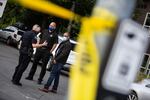
Police Chief Chuck Lovell, right, responding to a call in Portland, Ore., Sunday, June 28, 2020. Lovell and the head of the police union tied a recent rise in gun violence to the disbanding of the Gun Violence Reduction Team, which was accused of racial profiling.
Bradley W. Parks / OPB
As Portland experiences a surge in shootings, two top police officials are connecting the spike to the city’s decision to disband the local police unit tasked with investigating gun violence.
The Gun Violence Reduction Team, known as the GVRT, was dissolved at the beginning of July. Many community members and activists had long called for the dismantling of the unit, which they said disproportionately targeted people of color. Amid mass calls for police reform nationwide, Commissioner Jo Ann Hardesty, one of the unit’s most outspoken critics, launched a successful push to get the unit disbanded.On Wednesday, both Portland’s police chief and the head of its police union framed the decision as misguided. They said the rise in shootings is tied to the decision to end the team devoted to solving them.
“I’d say they’re more emboldened, maybe, to be out with guns,” Portland Police Chief Chuck Lovell said at a press conference Wednesday. “They know there’s not someone watching. There’s no real deterrent there. And I think that’s part of the issue that’s causing us to see the spike we have in July.”
Related: Gun violence reduction programs struggle with long-term success
This summer, Portland — along with many other U.S. cities — has seen a startling rise in gun violence and homicides. Police reported 15 homicides in July, the highest per-month number the city’s seen in three decades. And according to the bureau, there were 98 shootings in July, up from 35 in 2019.
July 2020 is difficult to compare to July of past years for a host of reasons. Nightly demonstrations against police entered their second month. Federal officers arrived downtown. A global pandemic raged.
On Wednesday, Lovell said he believed there could be multiple factors contributing to the surge in violence — and that the fact that this was the first month without the GVRT could be one such factor.
The GVRT was rebranded from the Gang Enforcement Team in October 2018. An audit of the unit’s work in 2015-16 found the officers disproportionately stopped Black people. On Wednesday, Lovell defended the now-defunct unit, saying he did not believe it was racist and that cities that do similar gun violence prevention work would have similar rates.
“The stops have gotten a lot of attention. But a lot of those stops end in handshakes and conversation, and there’s a real kind of familiarity,” he said. “And people miss it. We heard a lot from people in the community saying, ‘Hey, we need the Gun Violence Reduction Team back. We need those officers that know our community.’”
Hours later, the Portland Police Association followed up with a similar plea. In a press release titled “Recognizing when a mistake is a mistake,” the union representing rank-and-file officers urged the city council to reinstate the GVRT.
After the Council voted to defund the unit in June, Daryl Turner, the union’s head, called the decision “one of the biggest mistakes” that Portland Mayor Ted Wheeler, who oversees the police bureau, had ever made and warned gun violence would rise.
Related: With feds gone, Oregon leaders must focus on protesters' demands
The union now says those fears are coming to fruition. In a statement, the union traced the rise in gun violence to the absence of the GVRT, though did not mention the other factors that could contribute to the spike.
“It is time for our elected officials to keep Portlanders safe and stop the knee-jerk reactions that look progressive when, in fact, they could be costing lives,” the release read. “… The dissolution of the GVRT left a void, the result of which is a rise in shootings; to pretend otherwise is negligent.”
The mayor’s office has announced a news conference at 10 a.m. tomorrow to discuss the recent rise in gun violence. The office said it’s a “community event,” and the mayor will not be speaking.
In mid-July, the mayor had said he saw the rise in shootings and the Council’s decision to cut the GVRT as unrelated.
“I don’t believe that the City Council’s vote on GVRT had any impact on these particular situations,” Wheeler said at the time. “The officers are still out there, they’ll still respond to calls.”
Lovell said Wednesday that he’d dedicated officers from patrol to work in the detective division to give “support for follow up” for investigations into the shootings.
